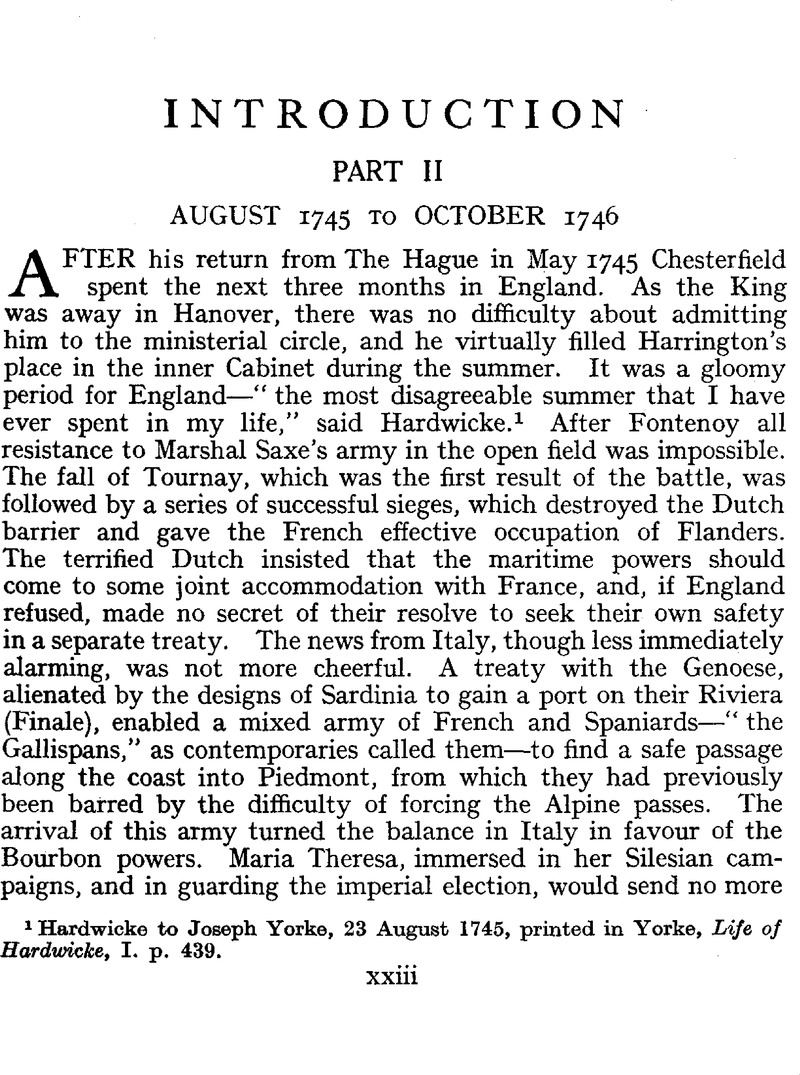No CrossRef data available.
Article contents
Part II, August 1745 to October 1746
Published online by Cambridge University Press: 24 December 2009
Abstract

- Type
- Introduction
- Information
- Copyright
- Copyright © Royal Historical Society 1930
References
page xxiii note 1 Hardwicke to Joseph Yorke, 23 August 1745, printed in Yorke, Life of Hardwicke, I. p. 439.
page xxiv note 1 An intercepted dispatch from Zöhrern (left in charge of the Austrian legation when Wasner followed the King to Hanover) of 13 July N.S. 1745 shows the importance of this event. He expresses the hope that the news about Cape Breton is true, “in order to raise the spirits of the people, that have been quite dejected by the late bad news, particularly from Flanders, and by the behaviour of the Dutch there, insomuch that, unless something considerable be performed by Marshal Traun's army, on which all their hopes are now placed and the election of an Emperor depends, a change of measures is to be feared here.” P.R.O. S.P. For. Confidential, 62.
page xxvi note 1 Harrington graphically describes his difficulties, and hints very clearly his distrust of his colleagues, in a private letter to Newcastle of 15 August (N.S.) 1745 (Add. MSS. 32,705, fo. 10). His troubles were increased by Frederick's threatening declaration against Saxony, which George II was pledged by treaty to defend. See his subsequent letter of 22 August (ibid. fo. 29). This latter problem was solved by Frederick's promise to postpone any attack on Saxony till Maria Theresa's answer had been received.
page xxix note 1 In September they were on the verge of resigning on this ground. See Hardwieke to Newcastle, 15 September 1745, where he concludes, “whether in or out of power or place, I am ever yours”. Add. MSS. 32,705, fo. 183.
page xxix note 2 See especially his letter of 25 November. Below, p. 89.
page xxx note 1 Richmond to Newcastle, 16 September 1745 (Add. MSS. 32,705, fo. 187).
page xxx note 2 Below, p. 70.
page xxxi note 1 See below, p. 74, note.
page xxxi note 2 Among others, by Lord Rosebery, in his Chatham, Early Life, p. 246. Lord Rosebery is not quite accurate in his account of foreign affairs, but he has drawn some characteristically vivid portraits of the chief political actors of this period.
page xxxii note 1 Below, p. 84.
page xxxiii note 1 Below, p. 101.
page xxxv note 1 The first suggestion of the cession of Tuscany to Don Philip, which was for a short time prominent in 1746 and impelled d'Argenson to frame his project, was made in article 4 of a scheme for a peace settlement which was drawn up in July 1745 by Trevor and the Pensionary van der Heim. Trevor sent it with an apologetic and explanatory letter to Henry Pelham, and it was seriously considered by the inner Cabinet in London, though no action was taken as the result of the negotiation with Prussia was not yet known. See Trevor Papers (Hist. MSS. Commission Report), pp. 122–130. This wholly unofficial and unauthorised scheme found its way into the papers entrusted to Larrey and to Wassenaer, and was disinterred from them by Wassenaer and Gilles.
page xxxvi note 1 This important dispatch of 16 May (O.S.) is in S.P. For. Germany (Empire), 173.
page xxxviii note 1 Harrington's much debated dispatch to Trevor of 20 May (O.S.) is in S.P. Holland, 418. A full account of the discussions, with the letters which passed between Newcastle and Hardwicke, is given in Coxe, Pelham Administration, I. 487–490. Two unpublished letters of Newcastle, giving more summary accounts of the discussions, are printed below in Appendix B.
page xxxviii note 2 S.P. For. Holland, 418, fo. 342.
page xl note 1 See Chesterfield to Trevor, 14 August (O.S.), in. Trevor Papers, p. 149.
page xli note 1 Marchmont Papers, I. 182. Chesterfield is reported as saying “that on his arrival here the Duke of Newcastle spoke to him of being Secretary, if Lord Harrington quitted or was turned out; and that he had refused it, saying he would keep Ireland as long as he was in place.”
page xlii note 1 I have relied for this account of Chesterfield's appointment, an event which startled contemporaries and has puzzled biographers and historians ever since, upon a letter which Newcastle wrote to Hardwicke on 28 October (O.S.). It is true that Newcastle's evidence is always to be regarded with suspicion. He tried to pacify his brother by minimising his share in the transaction, while his incurable egotism impelled him to magnify it to others. But he was more likely to tell the truth to Hardwicke than to anybody else. Moreover there is endless circumstantial evidence to support his story. For instance, almost the first act of Chesterfield as Secretary was to order Lord Hyndford to open negotiations for the 30,000 Russians. The letter is to be found in the Hardwicke Papers in the British Museum, vol. 60, fo. 280. It has been printed in Yorke's Life of Hardwicke, I. p. 367, but it is so vital to my story and has attracted so little attention that I have reproduced it in Appendix C. Marchmont's account, hitherto generally accepted, is in Marchmont Papers, I. p. 185. For Newcastle's letters to Sandwich see Studies in Eighteenth Century Diplomacy, p. 188.
page xlii note 2 Studies in Eighteenth Century Diplomacy, p. 224 and note.
page xliii note 1 Ibid. p. 189, note 2.
page xliii note 2 Ibid. p. 283 and note.
page xlv note 1 There is a good account of the absurdities of the two Secretaries of State in F. S. Oliver, The Endless Adventure, p. 256.




